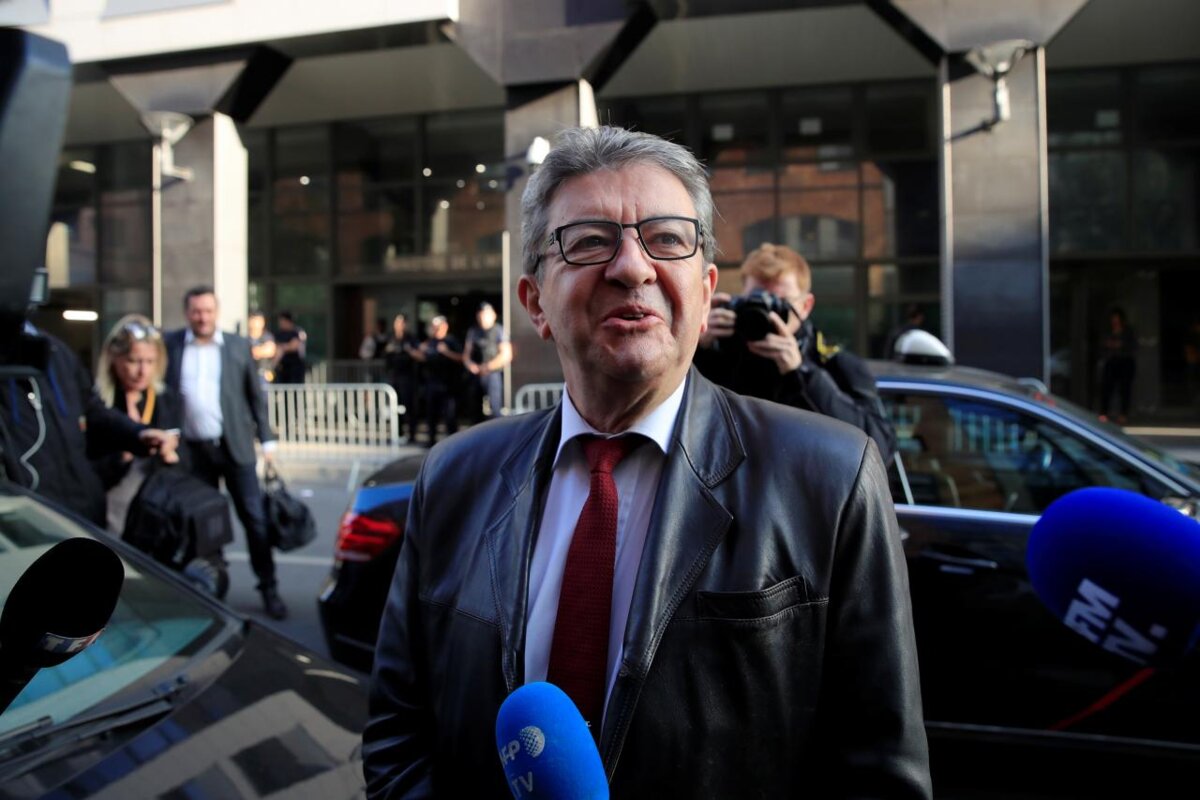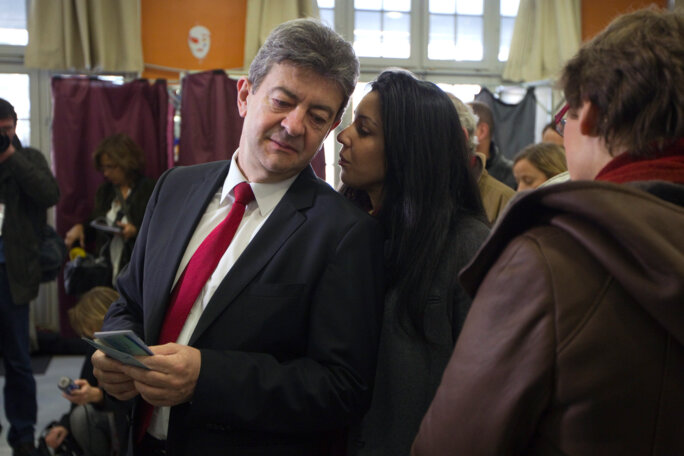In the wake of police searches carried out on October 16th of the home of the radical-left France Insoumise (France Unbowed) party leader Jean-Luc Mélenchon and those of several members of his close entourage, as well as at the headquarters of his party, Mélenchon has denounced what he called a political plot to destabilise him.
In a vitriolic speech during a press conference on Friday, Mélenchon also attacked the media, which he said was carrying out a witchhunt against him.
The raids last week, carried out by officers from the anti-corruption and financial crime squad (OCLCIFF), were part of preliminary investigations launched by the public prosecutor’s office into suspected irregularities, notably the suspected use of deliberately overpriced invoices by a public relations company, in the financial accounts of Mélenchon’s 2017 presidential election campaign.
Mélenchon, 67, came fourth, with a 21.5% share of the vote in the first round of voting in the elections, won by Emmanuel Macron in a second-round play-off against far-right Front National party leader Marine Le Pen.

Enlargement : Illustration 1

A central figure in the judicial investigations behind the police raids last week targeting Mélenchon is Sophia Chikirou, his communications manager during the 2017 election campaign. Her company, Mediascop, entirely owned by her, benefitted financially from being the preferred service provider for the radical-left leader’s campaign.
Chikirou, 39, was last week questioned by police as part of their investigations into suspected fraud, breach of trust, violation of election campaign laws and undeclared work. She is suspected of receiving undue payments via her company Mediascop, and also overcharging for several services rendered during the election campaign.
During the 7am raid on Mélenchon’s home last Tuesday police discovered that Chikirou was present. According to information gained by Mediapart, the two have for some time been involved in an extra-professional relationship. While otherwise a private matter, in the context of the investigation it can be regarded a s a matter of public interest.
If the suspicions that have given rise to the investigation are borne out, it would mean that Chikirou received the payments in question during a presidential campaign conducted by a politician with whom she was having a steady intimate relationship.
Neither Mélenchon, who was questioned by investigators on October 18th, nor Chikirou, questioned on October 19th, have answered Mediapart's repeated requests for comments. But on Friday, when asked at a press conference about the nature of his relationship with Chikirou, Mélenchon answered, “Excellent, sir”, adding: “If you want to point out that she is a woman and I am a man and that that might mean something, I will remind you of my [civil] status. You know what it is?” He told the assembled press that he is officially single and called their questions on this subject “insidious”.
Within the France Insoumise and within Média – a news website supported by the party, co-founded and run by Sophia Chikirou until an internal crisis arose owing to suspicions of financial irregularities – she has become a linchpin of Mélenchon's political strategy over recent years. She is also a taboo subject inside the party on account of her relationship with him.

Enlargement : Illustration 2

Chikirou was previously a militant for the political current within the French Socialist Party behind Laurent Fabius, former prime minister and latterly foreign minister under the presidency of François Hollande. She then joined supporters of socialist Jean-Marie Bockel, who was to become a junior trade minister under conservative president Nicolas Sarkozy. Shortly after Sarkozy’s election in 2007, Chikirou said that she supported his “will to reform”. In 2012 she was appointed as Jean-Luc Mélenchon's press relations officer, subsequently carryong out assignments in Ecuador and the US, where she observed the strategy of Bernie Sanders' election campaign, before returning to pilot La France Insoumise's strategy for the elections in 2017.
For Mélenchon’s 2017 presidential election campaign, her company Mediascop, of which she is sole shareholder, handled all the communications activities and which were billed to the candidate. But Chikirou, unlike other service providers, also held the position of campaign communications manager. She was a service provider for a campaign of which she was also a manager.
Over the course of the whole campaign, her company provided communications services that were billed at 1.161 million euros, representing more than 10% of the total cost of Mélenchon's campaign, broken down into two multi-page invoices sent to the party at the end of 2016 and in the spring of 2017.
During its audit of the party’s campaign spending, the France’s election campaign auditing body, the CNCCFP, took issue with several amounts Mediascop charged for its services, which exceeded the CNCCFP’s reference model for services fees by an estimated 35,000euros. But Chikirou's invoices have since been the object of further questions.
In a report on October 19th, the investigative reporting team at public broadcaster Radio France questioned several original expense items, such as the subtitling of campaign videos, for which Mélenchon’s campaign-funding association was charged 200 euros per minute. The Radio France report calculated that Chikirou's personal services were valued at “close to 120,000 euros on Mediascop's invoices”, or an average of 15,000 euros per month for an eight-month campaign. Other salaried campaign workers were paid considerably less.
Questioned in March during Mediapart’s initial investigations into Mediascop's invoices, Mélenchon’s campaign manager Manuel Bompard said he did not know the margins charged by the “outside service provider”, even though he was working alongside Chikirou on a daily basis within the France Insoumise party.
Shortly after the end of last year’s election campaign, Chikirou embarked on a new project to create a “humanist, anti-racist, environmentalist and feminist” web TV channel. In January 2018, the France Insoumise party e-mailed its around 500,000 militant supporters to answer Sophia Chikirou's call for donations.
But on July 4th 2018, just seven months after the launch of the new media outlet crowdfunded by thousands of individuals, Chikirou left the project amid a social, editorial and financial crisis. The web channel was in financial straits and an internal petition was launched against her managerial model. She finally took the initiative by announcing to Mélenchon that she was quitting before the 2019 European elections.
One month later, Média’s new management challenged Sophia Chikirou's financial management and blocked a payment to Mediascop, which was apparently ordered by Chikirou, of 67,146 euros. Interviewed by Mediapart, journalist Aude Lancelin, one of the new editorial team at Média, described the payment as a “bid to kill Média”, while Chikirou insists the payment was rightly due for services rendered. Both sides have threatened to take the matter to court.
Meanwhile, during a police search also carried out last Tuesday at the home of Mélenchon’s friend and long-time collaborator Pierre Moro, more than12,000 euros in cash was discovered. Moro, nicknamed ‘Pelou’ by Mélenchon, told the investigators that the sum had been entrusted to him by Marie-Pierre Oprandi, Mélenchon's official treasurer during the 2017 campaign, who he said had asked him to discreetly safeguard the money.
Contacted several times by Mediapart, Marie-Pierre Oprandi declined to be interviewed. Mediapart was unable to contact directly Pierre Moro and so asked several officials of La France Insoumise, beginning with its secretary-general Manuel Bompard, to pass our questions on to him. No response was received.
In their book about the France Insoumise leader, entitled Mélenchon, à la conquête du peuple, journalists Stéphane Alliès, co-editorial director of Mediapart, and Lilian Alemagna from French daily Libération, describe Pierre Moro as “the last of the childhood friends spared by the many rifts that have marked Jean-Luc Mélenchon's political and personal life”.
A friend of Mélenchon from their years together at secondary school, Moro never left the party leader’s entourage before taking retirement in July 2011. He was by turns Mélenchon's driver, assistant and even deputy chief of staff when Mélenchon served as the then socialist government’s Minister of Vocational Education between 2000 and 2002, ready and willing to carry out any militant task for the man he likes to call “the boss”.
-------------------------
- The French version of this article can be found here.
English version by Eric Rosencrantz


